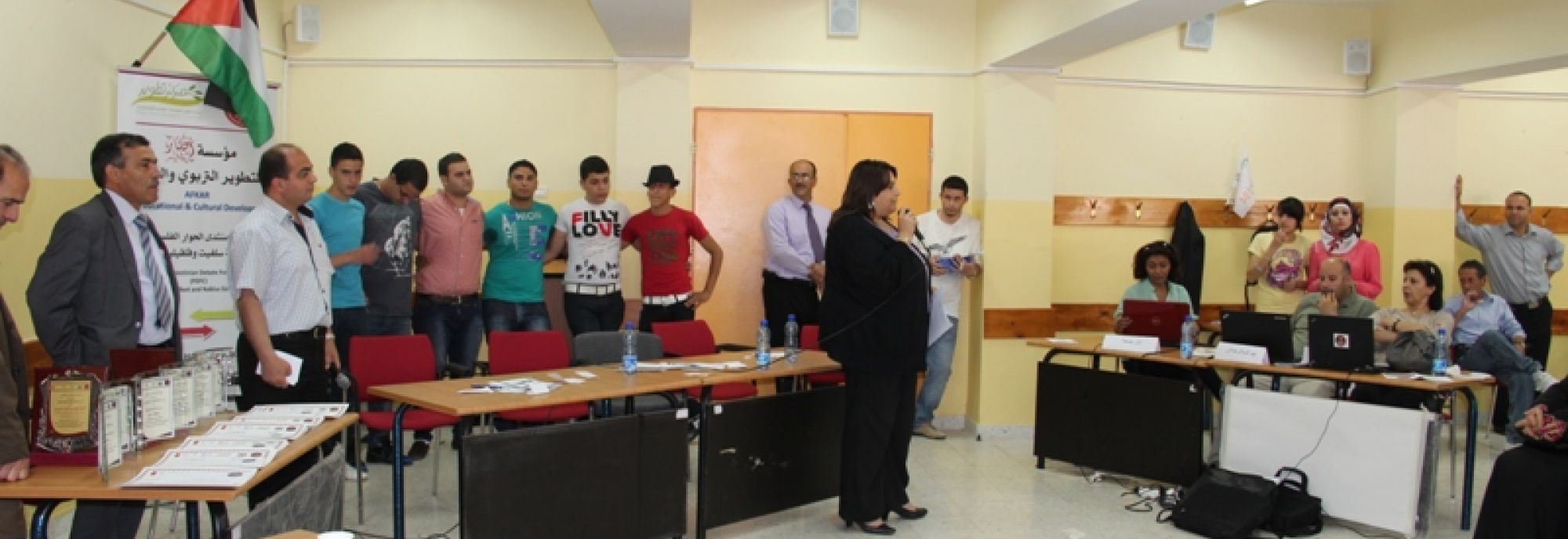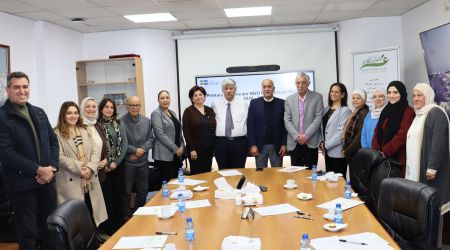
AFKAR for Educational and Cultural Development accomplished, as of PDFC events, and in cooperation with the Ministry of Education/ General Administration for Activities and Programs, the second chapter of the preliminary phase, funded by the NGOs Development Center (NDC), on Thursday 10/5/2012, at Al-Ispaniyah School in Salfit.
Moreover, AFKAR also concluded the first chapter of the same phase aforementioned, funded by the German Rosa Luxemburg Foundation, on Sunday 20/5/2012, at the Directorate of Education in Ramallah. The second of this phase will initiate at the beginning of the next scholastic year 2012/2013. Those two chapters targeted 192 students, 43 school coordinators of 43 public schools distributed on the governorates of Nablus, Qalqelia, Salfit and Ramallah.
The Director-General of AFKAR, Mr. Odeh Zahran, praised the Ministry of Education/ General Administration for Activities and Programs, represented by Ms. Ilham Muhesen, for its role and belief in AFKAR’s activities and programs and its positive effects it prints in the learning process and students’ personalities. Mr. Zahran also commended the role the Education directors involved in the competition, and the principals of participating schools for their readiness and continuous support for extracurricular activities, being grateful to their cooperation with the organization in making way to empower and improve students’ abilities and their coordinators’ efforts in facilitating and following up to the program with their students. He also thanked NDC and Rosa Luxemburg Foundations for their roles in supporting and adopting this program, putting it on the top of their priorities and interests.
Debate topics among students evolved around social, political and human rights issues such as: women’s right to work, women’s quota, the legality of death penalty, and other exciting, controversial cases in which students discussed passionately and confidently. All contestants built their interventions on scientific evidence, proven statements, resources and tools to backup their point of view and refute the others’. Civilized standards of debate and respect were dominant.
As for the events of the competition, in its second chapter, 20 schools from the governorates of Nablus, Salfit and Qalqelia debated, where the school that won first place in each governorate was nominated to compete with the other winners. In Nablus, Al-Malik Talal Boys School got first place, where the students opposed women’s right to work. Similarly, Fatmah Srour Girls School, the Qalqelia school winner, opposed death penalty, assuring that the state doesn’t not ahve any legal right to take someone’s life. The students also supported their arguments stating that life imprisonment is the “humane” alternative that can adjust one’s behaviors. As for Kifel Hares Girls School, the winner to Salfit, debated against the system of Tawjihi in Palestine, which lacks the mechanisms of creativity and choice. This old-fashioned system gets the worst attitudes and behaviors from students such as stress and psychological tension.
Before announcing the final results of the competition, Mr. Rafiq Salameh, the Education director in Salfit, thanked the audience and the participating schools and coordinators, in addition to AFKAR, for their efforts in making this project a success. Then Ms. Jamileh Sahliyeh, NDC programs director, gave a speech thanking the audience, AFKAR, and all involved parties in the competition. She added that such original and creative project which is part of NDC Good Governance and Human Rights program, would definitely make a difference in students behaviors and pave the foundations of good governance and enhance human rights education in schools. After that, AFKAR along with Ms. Sahliyah and Mr. Salameh distributed trophies to the directors of Education of the participant governorates. Following that was the distribution of trophies and certificates to the participating schools and students by Mr. Salameh and Ms. Sahiliyeh. In the end, Mr. Zahran announced Fatmah Srour Girls School/ Qalqelia, Kifel Hares Girls School/ Salfit and Al-Malik Talal Boys School/ Nablus as the first three winners respectively.
With regard to the first chapter of the preliminary phase, which was concluded in the Directorate of Education in Ramallah, Mr. Ayyoub Rabah, the Education director of Ramallah, welcomed the participants, praising their efforts, focusing on the importance of debate and empowering the concept of communication in schools among students, while Ms. Ilham Muhesen, the Director General of the Ministry of Education/ General Administration for Activities and Programs, thanked the participating schools, in addition to AFKAR, emphasizing the partnership between the Ministry of Education and institutions of the civil society in developing the students’ abilities and providing them with qualitative opportunities as PDFC.
In this chapter, six schools from Saflit and Qalqelia concluded the competition, where both Azzun Boys School and Bidya Girls School won first place, temporarily. As for Ramallah, the students debated around many controversial topics. Silwad Girls School opposed the new law of tax imposed by the Palestinian government based on the fact that it raises income taxes not by raising tax rate, but rather by broadening the tax base. As for second place, Kobar’s Boys School, which was in favor with the new tax law, affirmed its interventions based on the ability of this law to improve the Palestinian tax system and to decrease the dependence on Western and foreign support. This procedure had to be taken as Palestinian economy was considered non-productive. In the last session, Ajjoul’s Co-ed School took the opposition side against early marriage defending its proof on the fact that it forms a constraint to girls’ education and development. Moreover, girls are not either physically or emotionally matured in this early age to handle this kind of responsibility. Before the announcement of the semi-final results, Mr. Samir Shalaldeh, the Board Director of AFKAR, thanked the general administration of activities and all people involved, including the working staff, for their efforts and cooperation in making the program a success in its first chapter.
On the other hand, based on regular evaluation and feedback, AFKAR has been working to improve PDFC to meet the desired objectives. This year, it added another phase called Self-Execution Phase to the program. This addition focuses on implementing the program regularly by the trained teachers in targeted schools who participated in the first chapter of PDFC. It is worth mentioning that the judging criteria should consider the advanced level of a two year school performance. Five schools from Qalqelia and Salfit were chosen to carry out this phase.
Women’s quota was the hot issue Deir Istya Girls School strongly supported this procedure arguing that that would be indispensible and a positive affirmative action towards women’s empowerment and role in the community. By contrast, Sarta Boys School took the opposition stance arguing that this is a mere discrimination against women’s empowerment and qualification. In another session, Abu Ali Eyad Girls School took the opposing position against E- education defending that this system prevents any human interaction between the teacher and the student, and eliminates any spirit of competition or motivation amongst students.
It should be noted that the Self-Execution Phase targeted ten and eleven graders. During this phase, they were trained on debate concept and criteria in addition to critical thinking skills. This offers a unique opportunity for students to be responsible, active, proactive and participatory individuals within their community.

